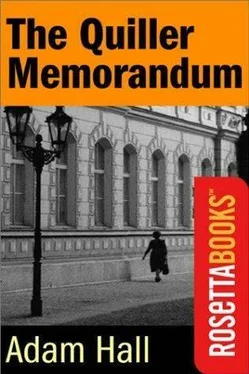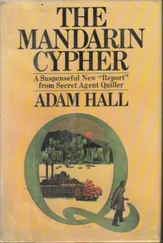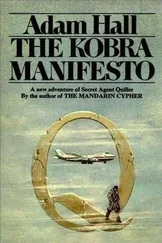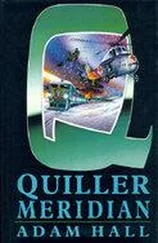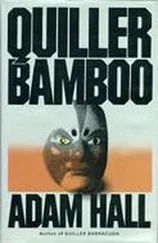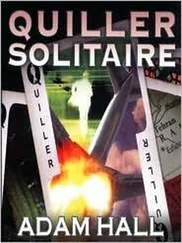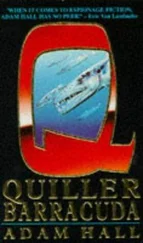Adam Hall - The Quiller Memorandum
Здесь есть возможность читать онлайн «Adam Hall - The Quiller Memorandum» весь текст электронной книги совершенно бесплатно (целиком полную версию без сокращений). В некоторых случаях можно слушать аудио, скачать через торрент в формате fb2 и присутствует краткое содержание. Жанр: Детектив, на английском языке. Описание произведения, (предисловие) а так же отзывы посетителей доступны на портале библиотеки ЛибКат.
- Название:The Quiller Memorandum
- Автор:
- Жанр:
- Год:неизвестен
- ISBN:нет данных
- Рейтинг книги:5 / 5. Голосов: 1
-
Избранное:Добавить в избранное
- Отзывы:
-
Ваша оценка:
- 100
- 1
- 2
- 3
- 4
- 5
The Quiller Memorandum: краткое содержание, описание и аннотация
Предлагаем к чтению аннотацию, описание, краткое содержание или предисловие (зависит от того, что написал сам автор книги «The Quiller Memorandum»). Если вы не нашли необходимую информацию о книге — напишите в комментариях, мы постараемся отыскать её.
On its publication in 1966, THE QUILLER MEMORANDUM received the Edgar Award as best mystery of the year.
The Quiller Memorandum — читать онлайн бесплатно полную книгу (весь текст) целиком
Ниже представлен текст книги, разбитый по страницам. Система сохранения места последней прочитанной страницы, позволяет с удобством читать онлайн бесплатно книгу «The Quiller Memorandum», без необходимости каждый раз заново искать на чём Вы остановились. Поставьте закладку, и сможете в любой момент перейти на страницу, на которой закончили чтение.
Интервал:
Закладка:
I told Pol: "You won't see any adverse action. There's no risk. They think I'm dead. They're still watching the flames. They won't look for me again. So don't worry."
The London line began ringing. He answered the call and did a lot of listening, then hung up. He told me
"They've signalled British Military H.Q. Berlin. At twelve noon today the Commandant is sending four armoured cars to the Grunewald base with fifty troops."
"London always did get the fidgets when there's a flap on." I looked down from one of the windows. The street was filling with traffic. "Will you please phone me a taxi? And has anyone got an overcoat my size?" It looked cold down there, and my own coat was hanging on a peg in the kitchens of the Hotel Zentral.
Sleet was falling again as I crossed the pavement and got into the taxi, right in the middle of the Zeiss close-focus square-15's they had up there. But there would be no tags. I was dead.
Ebert opened the door himself as a gesture of courtesy and invited me to take breakfast with him.
"You have an important client for me, Herr Quiller?"
He was more jovial at the breakfast-table than in his office. I said: "Several, Herr Generalstaatsanwalt. We shall be notifying you later in the day." He gave me a long look from under his pink-and-blond eyebrows, then took another slice of pumpernickel. I remembered he didn't really know who I was. "But I came to ask you a favour," I said. "There is a man I would like to talk to, and you could probably arrange the introduction. He is Bundeminister Lobst."
Ebert ruminated, saw no connection, gave it up and said "Certainly I shall arrange it."
"At his office, as early as possible. I imagine he gets there about nine, being a busy man. Don't give my name."
"As you wish."
The territories of Ebert and Lobst abutted, and they would know each other well in their official capacities. This was why I had come to Ebert, whom I trusted and who trusted me.
He made two telephone calls and said that I would be shown in to the Bundeminister's office on arrival at any time after nine o'clock. The Generalstaatsanwalt would be glad if I would convey to the Bundeminister his personal greetings.
There were forty-five minutes to go so I found an early barber and had a shave, manicure and neck-trim to take the fatigue away. It was nine o'clock precisely when I was shown into the Bundeminister's office. He was speaking on a telephone and his secretary had quietly gone away before he finished the call and turned in his chair and looked at me, but I had been prepared for the secretary still to be here so it would have been all right anyway.
He just sat there without moving or reaching for a drawer so I took my time crossing to his desk. He started to get up and I moved round the desk and brought my right hand flattened and palm-down and very fast against the side of the neck, taking off some of the force at the last inch so that he wouldn't be under for too long.
Then I left him and locked both doors and came back and sat on his desk.
"Zossen," I said, "I want to know everything."
It made me angry: he just sat there with his eyes turned up a little, trying to focus on my face; but he was a man like that, who never lowered himself to physical action. He gave the orders and signed the papers and left it to his henchmen to do the work.
His eyes were getting their focus now and he said loosely "It was reported that you were dead." I studied his face. It was worse than cruel: it was greedy. It was an eater's face, a devourer's, the eyes watchful for prey, the mouth long and thin and set between pouches, like a stretched H. It wasn't his face I had recognised in the Grunewald operations room, but his walk when he had moved from the desk to the map-table. Then I had looked at the face again and seen the ice-blue of Zossen's eyes set in the blubber of twenty years of greed.
This face had a third identity and it was public: I had seen it on the front pages of newspapers when Bundeminister Ernst Lobst had made a speech or greeted a visiting diplomat at Tempelhof. Thus I had known where to find him.
I had come here in case he had got wind of the raid at noon today and went to ground. I had come here to make him tell me everything, in case the raid misfired. And I had come here in the name of three hundred nameless men to whom he had once said: "I am due back in Brucknerwald in one hour, for luncheon."
He was fully conscious again and watching me. I told him to speak to his secretary on the inter-office line and give orders that he must on no account be disturbed for the next hour. As he pressed down the switch I said softly:
"The doors are locked. If you say the wrong thing I shall have a full minute before they break the doors down. I can do a lot to a man like you in sixty seconds. Be careful."
He spoke to his secretary and I was angry with him again because he was so helpless. I must remember the men of Brucknerwald. I must do what I came to do, even though he was helpless.
He closed the switch and I said: "Now you will tell me everything. Everything."
It was not quite ten o'clock when I left the office of the Bundeminister: the work had been quicker than expected. I had not taken a gun with me, nor any weapon at all; but we are not gentlemen, and we have our little ways. He had held out for close on twenty minutes and then broken, asking for mercy. Then he had told me everything.
On the way to the Unter den Eichen I phoned Captain Stettner at the Z Bureau. "I have someone for you." He didn't sound surprised when I told him the name. There was more than one Bundeminister on the Z Commission files. "I should go and pick him up straight away."
I knew he wouldn't be able to make a decent snatch because it was a job for the Selbstmord department, as it had been with Schrader, though in this case there hadn't been a gun. I just wanted it on record that I had last seen the Bundeminister alive.
Pol was still there when I went up to our place. He looked worried at seeing me so early: it was not yet half-past ten, and I had stipulated noon.
"What has gone wrong?"
"Nothing," I said. "Set up the tape."
They were all watching me obliquely and I kept my eyes down. I was bloody well fed up with them. When the tape was running I said
"Quiller. Report of interview with Bundeminister Ernst Lobst, true name Heinrich Zossen. General picture of imminent operation planned by Phoenix organisation is as follows."
The mechanism was simple enough and the pivotal factor was that the new German General Staff commanding the Bundeswehr in present-day West Germany had 5 00,000 fully-equipped troops under arms. In West Berlin the British, American and French troops totalled 12,000. The odds were thus worse than forty to one.
The operation was to be launched in two fast and successive phases: the creation of a cold-war crisis by an armed breach of the Berlin Wall and an attack by ground troops on the Allied garrisons in the west of the city. Air bombardment of East Berlin would provoke Russian counter-action at a time when Moscow and all Russian military bases would be suffering the outbreak of pneumonic plague.
The tape-spools turned silently.
"Reference Dr. Solomon Rothstein. Please see my report 34-A, following decipherment of Rothstein document. Now repeat: Rothstein was doubling with Phoenix. His own plan to start an epidemic of pneumonic plague in the Argentine was unknown to Phoenix. His second and concurrent plan was known to them: he was in fact working for them and under their orders. They asked him to prepare nine capsules of heavily-cultured pneumonic plague bacillus for special-messenger transit to Moscow and the eight major Russian military bases. These capsules were to be broken open in those nine centres and the bacillus introduced into foodstuffs four days prior to the air bombardment of East Berlin, so that the Russian forces counter-reacting in East Germany would be cut off from central directive and military supplies and reinforcements."
Читать дальшеИнтервал:
Закладка:
Похожие книги на «The Quiller Memorandum»
Представляем Вашему вниманию похожие книги на «The Quiller Memorandum» списком для выбора. Мы отобрали схожую по названию и смыслу литературу в надежде предоставить читателям больше вариантов отыскать новые, интересные, ещё непрочитанные произведения.
Обсуждение, отзывы о книге «The Quiller Memorandum» и просто собственные мнения читателей. Оставьте ваши комментарии, напишите, что Вы думаете о произведении, его смысле или главных героях. Укажите что конкретно понравилось, а что нет, и почему Вы так считаете.
